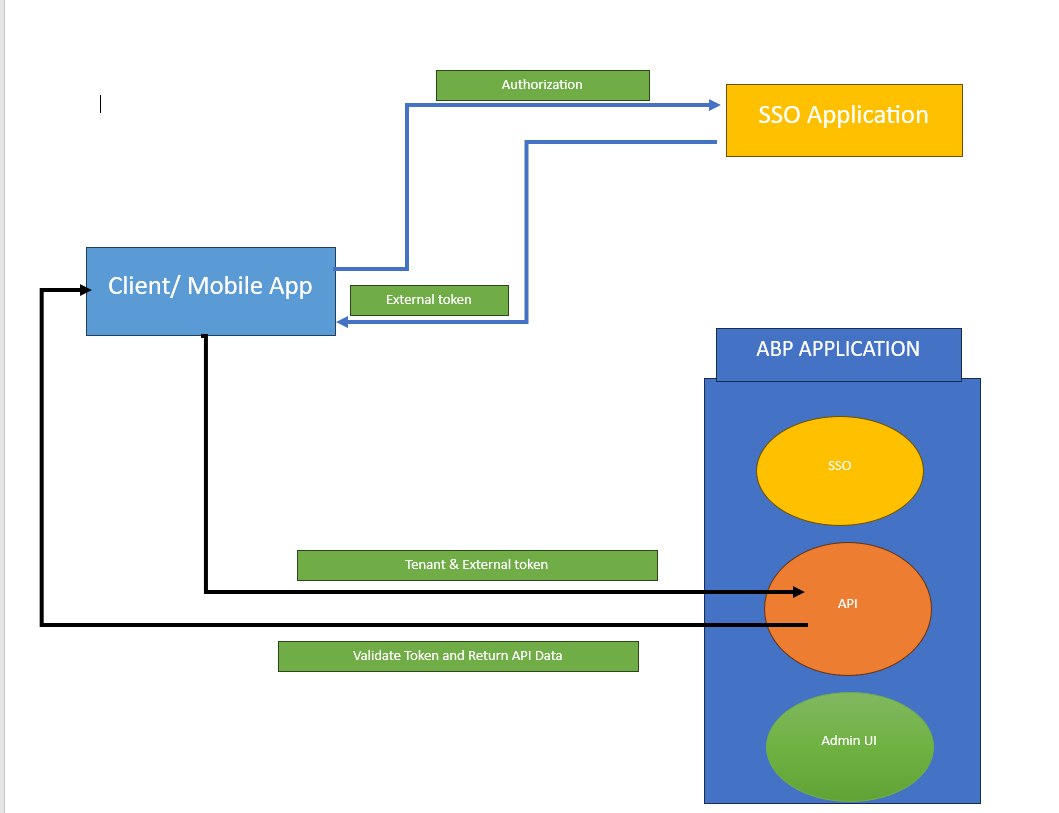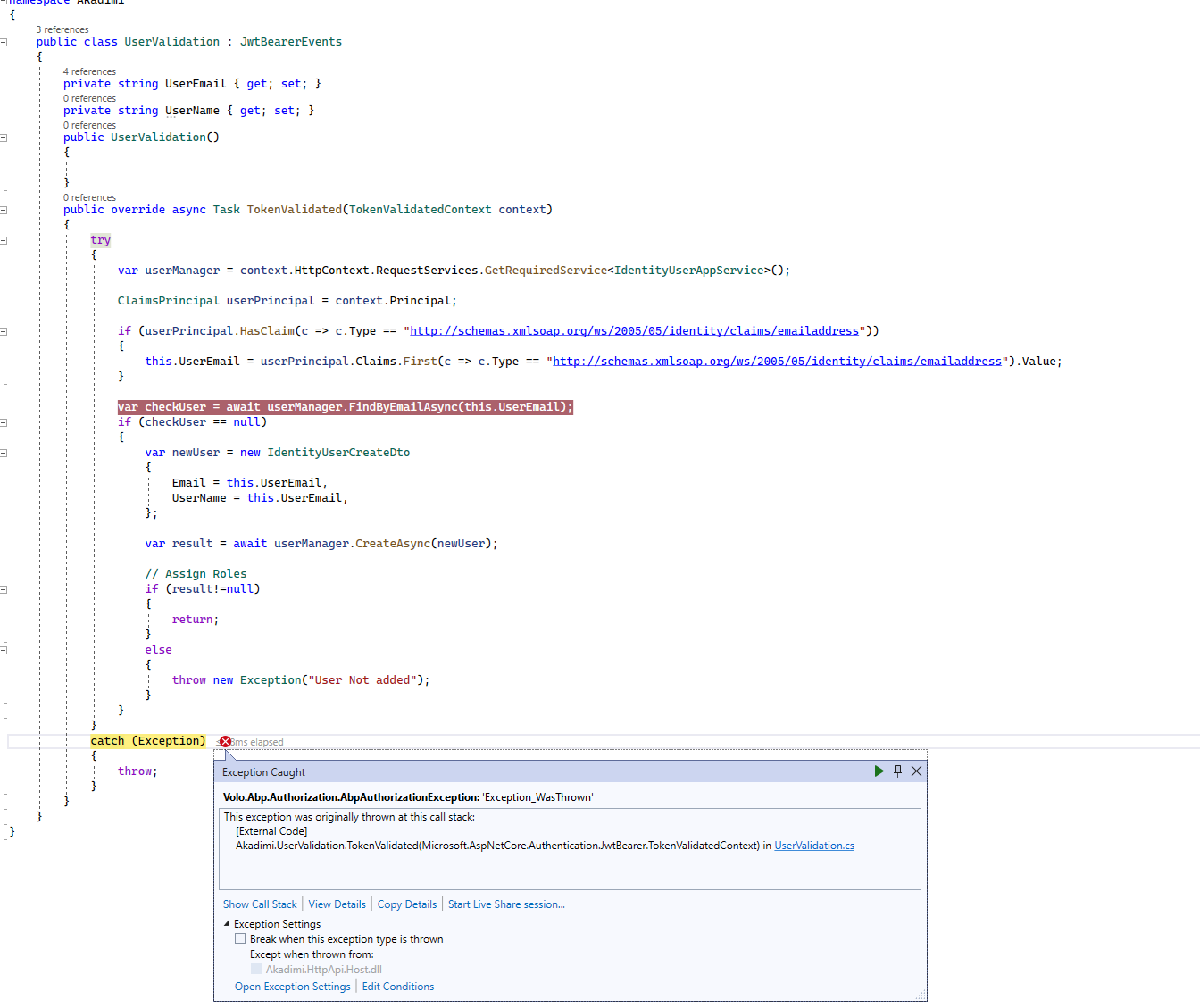ABP Framework version: v7.3.0
UI type: Angular
DB provider: EF Core
Tiered (MVC) or Auth Server Separated (Angular): yes
Exception message and stack trace:
Steps to reproduce the issue:"
- Client Application/Mobile app getting authorized and obtained token from External SSO Application
- API call initiated with the tenant and generated token
How to configure extra authentication to validate this external token in abp api application ? Here is the sample flow diagram.
37 Answer(s)
-
0
hi
obtained token from External SSO Application
What kind of SSO application? Is the token a
JWTtoken? -
0
hi
obtained token from External SSO Application
What kind of SSO application? Is the token a
JWTtoken?Yes JWT token
-
0
hi
You can add a jwt authentication scheme by
AddJwtBearer("your_jwt_schema", ...)and call theAuthenticateAsyncofhttpcontextvar result = await httpContext.AuthenticateAsync("your_jwt_schema"); if (result.Succeeded && result.Principal != null) { ctx.User = result.Principal; } -
0
your_jwt_schema
Hi, can you share a sample code ? Where should I call the AuthenticateAsync ?
In My API layer I have already one jwt authentication scheme is there, can I add multiple scheme? This is my existing
private void ConfigureAuthentication(ServiceConfigurationContext context, IConfiguration configuration) { context.Services.AddAuthentication(JwtBearerDefaults.AuthenticationScheme) .AddJwtBearer(options => { options.Authority = configuration["AuthServer:Authority"]; options.RequireHttpsMetadata = Convert.ToBoolean(configuration["AuthServer:RequireHttpsMetadata"]); options.Audience = "Test1"; }); } -
0
Yes, You can add multiple scheme
context.Services.AddAuthentication(JwtBearerDefaults.AuthenticationScheme) .AddJwtBearer(options => { options.Authority = configuration["AuthServer:Authority"]; options.RequireHttpsMetadata = Convert.ToBoolean(configuration["AuthServer:RequireHttpsMetadata"]); options.Audience = "Test1"; }).AddJwtBearer("your_jwt_schema", options => { options... }) -
0
Yes, You can add multiple scheme
context.Services.AddAuthentication(JwtBearerDefaults.AuthenticationScheme) .AddJwtBearer(options => { options.Authority = configuration["AuthServer:Authority"]; options.RequireHttpsMetadata = Convert.ToBoolean(configuration["AuthServer:RequireHttpsMetadata"]); options.Audience = "Test1"; }).AddJwtBearer("your_jwt_schema", options => { options... })Ok this one I mapped, Where should I add this code ?
var result = await httpContext.AuthenticateAsync("your_jwt_schema"); if (result.Succeeded && result.Principal != null) { ctx.User = result.Principal; } -
0
hi
You can call this code on controllers or
Authorize with a specific scheme in ASP.NET Corehttps://learn.microsoft.com/en-us/aspnet/core/security/authorization/limitingidentitybyscheme?view=aspnetcore-7.0
-
0
hi
You can call this code on controllers or
Authorize with a specific scheme in ASP.NET Corehttps://learn.microsoft.com/en-us/aspnet/core/security/authorization/limitingidentitybyscheme?view=aspnetcore-7.0
Hi, I added [Authorize(AuthenticationSchemes = "Bearer,jwt2")] attribute in the controller it's working fine. How can I apply both schemes by default in all controllers?
-
0
hi
https://learn.microsoft.com/en-us/aspnet/core/security/authorization/limitingidentitybyscheme?view=aspnetcore-7.0#use-multiple-authentication-schemes
-
0
hi
https://learn.microsoft.com/en-us/aspnet/core/security/authorization/limitingidentitybyscheme?view=aspnetcore-7.0#use-multiple-authentication-schemes
I mapped the schemes globally, working fine when I placed [Authorize] attribute in controller. But in ABP we don't have any [Authorize] attribute, it is in ApplicationService. If I remove [Authorize] attribute from controller and keeping [Authorize] attribute in ApplicationService class, it's giving me unauthorized.
[RemoteService(IsEnabled = false)] [Authorize] public class AuthorsAppService : ApplicationService, IAuthorsAppService{ ctor... public virtual async Task<PagedResultDto<AuthorDto>> GetListAsync(GetAuthorsInput input) {} } [RemoteService] public class AuthorController : AbpController, IAuthorsAppService{ } -
0
hi
Can you share a simple project? liming.ma@volosoft.com
I will download and check it.
-
0
hi
Can you share a simple project? liming.ma@volosoft.com
I will download and check it.
Ok I will create and sample project and share. One more question regarding the user mapping, How can I map user which is authenticated by external sso and our admin api, we have to match the users with email and set currentuser for permission management.
-
0
hi
How can I map user which is authenticated by external sso and our admin api, we have to match the users with email and set currentuser for permission management.
Im not understand very well, You can add some related code in your simple project.
-
0
Hi, this is basically the users who are authenticated from external SSO are not our application users, only the similarity is the email address. After token validation, I have to check if the user exists in our system with the email id, if the user does not exist with that email create a user with a specific role and then set the current user. My question is how can I execute these user checks and creation logic immediately after token validation?
-
0
Hi, I found a way to execute code after token validation. Added a JWTBearerEvent. How can I access users' data in TokenValidated, I tried to access using IdentityUserAppService but throwing the exception ABP Unauthorized in await userManager.FindByEmailAsync(this.UserEmail);
options.EventsType = typeof(UserValidation);public class UserValidation : JwtBearerEvents { private string UserEmail { get; set; } private string UserName { get; set; } public UserValidation() { } public override async Task TokenValidated(TokenValidatedContext context) { try { var userManager = context.HttpContext.RequestServices.GetRequiredService<IdentityUserAppService>(); ClaimsPrincipal userPrincipal = context.Principal; if (userPrincipal.HasClaim(c => c.Type == "http://schemas.xmlsoap.org/ws/2005/05/identity/claims/emailaddress")) { this.UserEmail = userPrincipal.Claims.First(c => c.Type == "http://schemas.xmlsoap.org/ws/2005/05/identity/claims/emailaddress").Value; } var checkUser = await userManager.FindByEmailAsync(this.UserEmail); if (checkUser == null) { var newUser = new IdentityUserCreateDto { Email = this.UserEmail, UserName = this.UserEmail, }; var result = await userManager.CreateAsync(newUser); // Assign Roles if (result!=null) { return; } else { throw new Exception("User Not added"); } } } catch (Exception) { throw; } } } -
0
hi
I guess on the
JwtBearerEventsmethod the authentication has not finished.You can call the app service after
app.UseAuthentication -
0
hi
I guess on the
JwtBearerEventsmethod the authentication has not finished.You can call the app service after
app.UseAuthenticationI am looking to impersonate a user after token validation, I did this but user unauthorised exception coming, After fetching the user I want to sign in with that user in order to access APIs, where should I exactly place the code to impersonate user after validation?
public override async Task TokenValidated(TokenValidatedContext context) { try { ClaimsPrincipal userPrincipal = context.Principal; if (userPrincipal.HasClaim(c => c.Type == "http://schemas.xmlsoap.org/ws/2005/05/identity/claims/emailaddress")) { this.UserEmail = userPrincipal.Claims.First(c => c.Type == "http://schemas.xmlsoap.org/ws/2005/05/identity/claims/emailaddress").Value; } var checkUser = await UserManager.FindByEmailAsync(this.UserEmail); if (checkUser == null) { checkUser = new Volo.Abp.Identity.IdentityUser(Guid.NewGuid(), this.UserEmail, this.UserEmail, _currentTenant.Id); var result = await UserManager.CreateAsync(checkUser); // Assign Roles if (result != null) { return; } else { throw new Exception("User Not added"); } } else { var newPrincipal = new ClaimsPrincipal( new ClaimsIdentity( new Claim[] { new Claim(AbpClaimTypes.UserId, checkUser.Id.ToString()), new Claim(AbpClaimTypes.TenantId, checkUser.TenantId.ToString()), new Claim(AbpClaimTypes.UserName, checkUser.Email), new Claim(AbpClaimTypes.Role, "admin") } ) ); _currentPrincipalAccessor.Change(newPrincipal); } } catch (Exception) { throw; } } -
0
hi
Can you share a simple project to reproduce the above exception?
liming.ma@volosoft.com
-
0
hi
Can you share a simple project to reproduce the above exception?
liming.ma@volosoft.com
Hi,
I have shared sample code here, can you check
-
0
hi
I downloaded the code. Any steps?
-
0
hi
I downloaded the code. Any steps?
You can see there, I used 2 JWTbearer, One is Internal, and the other is external,
- You have to create an external sso
- Create User in external SSO, email exp:** test@test.com**
- In the shared project create a new tenant and create a user for that tenant with same email id ** test@test.com**
- Create a sample API like getAuthors retrun some data
- Create a Client App and Authenticate user with that external SSO
- After getting the token Call getAuthor API with that token ( tenant you can hardcoded)
- Return author data For me this is giving UnAuthorised exception because of user not loggin in
-
0
hi
You have to create an external sso
I don't have any external sso. can share a test one?
I have to reproduce your exception on my locally.
-
0
hi
_currentPrincipalAccessor.Change(newPrincipal);will not work. It only works on using scope.eg:
using(_currentPrincipalAccessor.Change(newPrincipal)) { //working... } -
0
After getting the token Call getAuthor API with that token ( tenant you can hardcoded) Return author data For me this is giving UnAuthorised exception because of user not loggin in
Call getAuthor APIofTestApp.HttpApi.HostorTestApp.AuthServer? -
0
If you
Call getAuthor APIofTestApp.HttpApi.Hostand getUnAuthorisedYou can try to use
context.HttpContext.User = newPrincipal;to replace the_currentPrincipalAccessor.Change(newPrincipal);































































